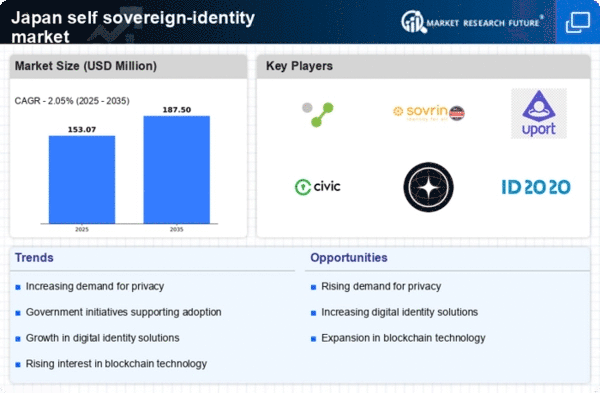Increased Data Privacy Concerns
In Japan, the self sovereign-identity market is experiencing a surge in demand due to heightened concerns regarding data privacy. With numerous data breaches reported in recent years, individuals are increasingly wary of how their personal information is managed. This has led to a growing interest in self sovereign-identity solutions, which empower users to control their own data. According to recent surveys, approximately 70% of Japanese consumers express a desire for more control over their personal information. This trend indicates a significant shift towards solutions that prioritize user autonomy and data security, thereby driving growth in the self sovereign-identity market. As organizations recognize the importance of addressing these concerns, investments in self sovereign-identity technologies are likely to increase, further propelling the industry forward.
Government Initiatives and Support
The Japanese government is actively promoting digital transformation initiatives, which include the adoption of self sovereign-identity solutions. Recent policy frameworks aim to enhance digital identity verification processes, thereby fostering trust in online transactions. The government's commitment to improving cybersecurity and data protection is evident in its allocation of approximately ¥10 billion to support digital identity projects. This financial backing is expected to stimulate innovation within the self sovereign-identity market, encouraging startups and established companies to develop robust solutions. Furthermore, collaboration between public and private sectors is likely to enhance the overall ecosystem, making it more conducive for the self sovereign-identity market to thrive in Japan.
Emerging Market for Digital Services
The self sovereign-identity market is benefiting from the rapid expansion of digital services in Japan. With the increasing reliance on online platforms for various transactions, the demand for secure and reliable identity verification methods is on the rise. Recent data indicates that the digital services sector in Japan is projected to grow by 15% annually, creating a fertile ground for self sovereign-identity solutions. As businesses strive to enhance security and user trust, the adoption of self sovereign-identity technologies is expected to gain momentum. This trend suggests that the self sovereign-identity market will play a crucial role in shaping the future of digital interactions in Japan, as organizations seek to align with evolving consumer expectations.
Rising Demand for Seamless User Experiences
In Japan, consumers are increasingly seeking seamless and efficient user experiences across digital platforms. The self sovereign-identity market is poised to benefit from this trend, as these solutions offer streamlined identity verification processes. By enabling users to authenticate their identities quickly and securely, self sovereign-identity technologies can significantly enhance user satisfaction. Recent studies indicate that 65% of Japanese users prefer services that minimize friction during identity verification. This growing preference suggests that businesses in various sectors, including finance and e-commerce, may adopt self sovereign-identity solutions to meet consumer expectations. Consequently, the self sovereign-identity market is likely to expand as organizations prioritize user experience in their digital offerings.
Technological Integration and Interoperability
The self sovereign-identity market in Japan is being driven by advancements in technology that facilitate integration and interoperability among various identity systems. As organizations increasingly adopt decentralized identity solutions, the need for compatibility with existing systems becomes paramount. This trend is underscored by the fact that approximately 60% of businesses in Japan are exploring ways to integrate self sovereign-identity solutions into their operations. The ability to seamlessly connect with other digital identity frameworks enhances the appeal of self sovereign-identity technologies, making them more attractive to enterprises. As a result, the self sovereign-identity market is likely to witness accelerated growth as organizations seek to leverage these innovative solutions to improve operational efficiency.
















